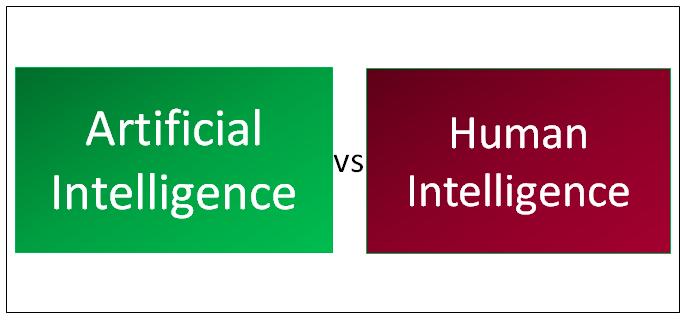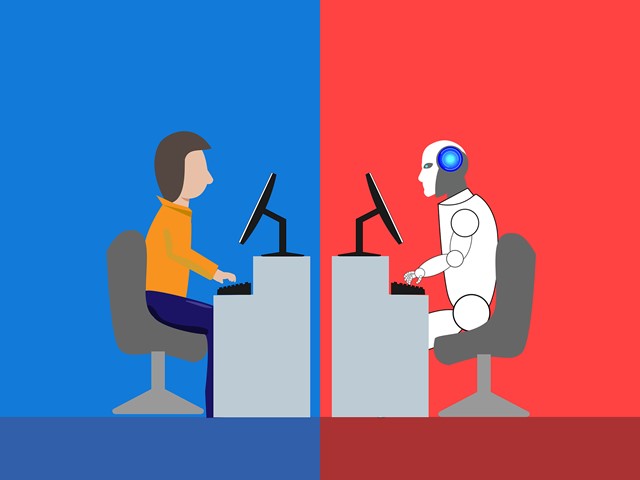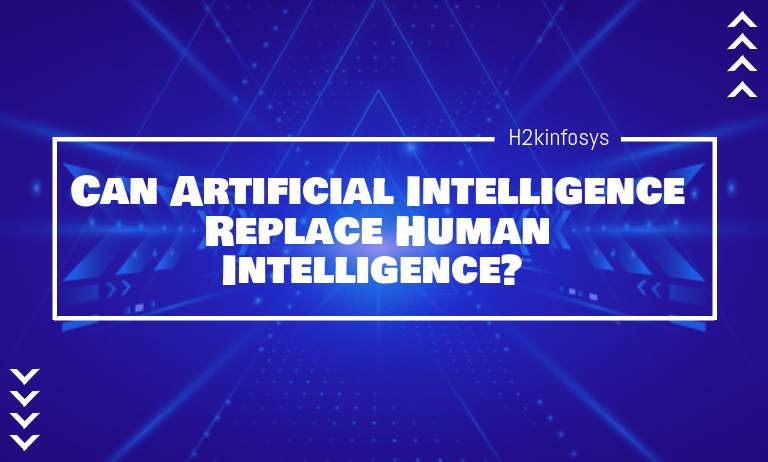Artificial intelligence (AI) is the science of building smarter, more human-like machines, and it’s clear that AI can do some chores faster and better than humans. AI helps people perform repetitive and time-consuming tasks. Artificial intelligence or artificial intelligence utilizes expertise to perform various routine tasks, almost all repetitive tasks can be automated by artificial intelligence. But can AI really replace humans? This has sparked an inevitable debate about AI vs. human intelligence. The answer is simple, no!
Table of Contents
Artificial Intelligence Vs Human Intelligence

Today, many AI-driven applications have faster execution, higher operational capabilities, smart work capabilities, and higher decision-making accuracy compared to humans.
We know that human intelligence is through adaptive learning and personal experience, it does not depend on data, it is pre-entered with data. But AI needs pre-entered data!
Indeed, our human memory, the computing power of our brains, and our entire body structure seem trivial to the hardware and software of a machine or robot.
The only reason is that we treat these advanced machines, systems, and robots as aliens and instinctively start to fear them, just as we fear lions in the jungle. This foreign thought in our heads drained our own God-given human intelligence and let the machines take over us! In the contrast between human intelligence and artificial intelligence, there are more opportunities for artificial intelligence to take over us.
Our brains are more complex, sophisticated, and have deep layers that machines cannot beat in the short term, at least for the next 35 years!
Can AI Replace Humans?
Let’s go back to the AI vs. human intelligence debate. No! Recent AI achievements are closely mimicking human intelligence, but not surpassing the human brain.
Our brains acquire knowledge through understanding, logic, learning, reasoning, and experience. The way we feel everything, and most importantly, emotion, sets us apart from digital machines, robots, artificial intelligence technologies, and more.
Your brain and heart make human intelligence more important than artificial intelligence.
However, with the development of artificial intelligence, the risks of artificial intelligence also increase due to our inability to fully utilize our brain and heart.
Although machines mimic human behavior, they still lack the ability to make rational decisions. Machines need the next level of evolution, they have to deal with “common sense”.
This evolution will take years as everyone’s common sense is different! This means that the AI system does not understand “cause and effect”. Although our decisions benefit some parts of human society, we humans do everything based on cause and effect.
Yes, AI does make our jobs easier, but there are also many failures.
All these disasters tell us to improve the capabilities of artificial intelligence by improving artificial intelligence technology with appropriate algorithms and data. Otherwise, AI will not be able to coexist with our ethics, morals, and efficiency.
Reasons Why AI Can’t Replace Humans?

- No emotional intelligence
Humans possess emotional intelligence, through which they can express emotions, express emotions, and read others on the fly. For example, businesses cannot replace all customer service with AI. Customers want personal communication because bots cannot express empathy and emotion to customers.
Without personal interaction with customers, businesses can end up losing customers. Artificial intelligence or artificial intelligence systems are reasonable, accurate, and fast. AI systems are not empathetic, culturally sensitive, or intuitive. From now on, these abilities that humans possess are what make them effective. Humans have the ability to read a face and instantly know what to say.
- Lack of empathy
Humans can share their feelings: joy, sadness, happiness, hope, gratitude, optimism, kindness…etc. Furthermore, it is difficult to understand that AI can display all expressions and interpret the emotions of others better than humans.
To earn people’s trust and loyalty, businesses will need a human touch, as people still prefer to communicate with humans over robots. AI-based machines or computers can mimic human speech, but they don’t have any empathy, nor do they miss the human touch.
- Inability to work creatively
With the rapid implementation of artificial intelligence, humans have the opportunity to take on more and more creative work. Not only in the creative field but also in finance or coding, humans need extra creativity to work and complete great projects.
Some businesses worry that the real potential of AI lies in upskilling workers by restoring error-prone, repetitive manual tasks through intelligent automation solutions. Businesses now know that with the implementation of AI, employees can spend more time on creative and higher-priority tasks.
- Can’t think outside the box
AI can’t discover creative ways to solve all kinds of new problems because its code doesn’t support it. Robots are known to be coded to work within their framework. AI or AI is not good at thinking critically through complex scenarios, analyzing context, and developing complex strategies.
AI can only process data encoded into its systems, but on the other hand, organizations and their teams are constantly interacting with the external environment. Unlike humans, AI cannot account for outside influences. Different work environments require different abilities to work under sudden changes.
- Inability to work creatively
With the rapid implementation of artificial intelligence, humans have the opportunity to take on more and more creative work. Not only in the creative field but also in finance or coding, humans need extra creativity to work and complete great projects.
Some businesses worry that the real potential of AI lies in upskilling workers by restoring error-prone, repetitive manual tasks through intelligent automation solutions. Businesses now know that with the implementation of AI, employees can spend more time on creative and higher-priority tasks.
Humans Will Build the Future
Based on current data and advances in AI, language processing, vision, image processing, development, and common sense remain challenges for machines that require human intervention. As AI is still in the developmental stage, the future depends on how we humans manage AI applications so that they adhere to human values and safety measures.
Prioritizing national security, the U.S. Department of Defense has developed a set of ethical principles for AI. Likewise, AI has a whole new dimension, an infinite pool of opportunities that humans can explore. We must focus on developing “trustworthy AI,” providing a promising model for AI innovation and governance, and look forward to embracing AI by advancing our AI-related software skills.
Summary
Today, most AI computers are very useful at solving specific problems in specific data systems. The keys to AI work are human insight, contextual awareness, and creativity. So the reason AI will never be able to replace humans is simple – humans will continue to give value to machines, computers, or devices that they are not good at.




